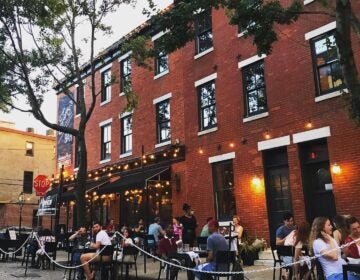Supreme Court rules for SugarHouse
Breaking News
Aug. 22
By Kellie Patrick Gates
For PlanPhilly
SugarHouse Casino has the right to build on state-owned land beneath the Delaware River, the Pennsylvania Supreme Court ruled late Friday. The decision knocks down one of the largest remaining hurdles to construction.
After months of reviewing testimony from both sides, a majority of the justices decided that the submerged lands license the city’s commerce department awarded to SugarHouse during the Street Administration still stands.
“We’re absolutely ecstatic,” SugarHouse Spokeswoman Leigh Whitaker said. “This gives us full control over our site, and allows us to build our project as approved by the city Planning Commission. This is significant for us in terms of moving the project forward.”
City Council and a group of waterfront legislators filed the Supreme Court case against the city in late December, after SugarHouse was first given the right to build on the riparian land via a submerged lands license awarded by the city’s commerce department. Their argument: The city never had the right to issue the license in the first place.
Shortly after taking office in January, Mayor Michael Nutter rescinded the license. First his administration said the Commerce Department had the right to grant riparian licenses, but the process by which SugarHouse officials got theirs was flawed. After more review, the city also decided that the Commerce Department never had the power to issue the license. They asked the court to dismiss the case, but the motion was denied. SugarHouse filed as an intervener, arguing that the new administration couldn’t change a decision made by the previous administration simply because it didn’t like it.
“It’s a disappointment,” said Terry Gillen, Nutter’s senior adviser for economic development and his casino point person. But Gillen said she could not comment on the specifics of the decision, nor on what the city’s next steps might be, until early next week. The law department will spend the weekend reviewing the ruling, she said.
“The decision effectively removes the General Assembly’s exclusive authority to control public land along the waterfront,” said Gary Tuma, spokesman for Sen. Vince Fumo, one of the riverfront legislators involved in the lawsuit. State leases on the land could potentially generate “tens of millions” in revenue, he said.
“The court authorized the transfer of state-owned land to a casino without payment to the state,” he said.
The decision does not strip the General Assembly of the power to grant riparian rights, Tuma said, but because it upholds the 1907 law, it says the city still has the right to grant leases along its waterways.
The General Assembly could vote now to repeal the 1907 law, Tuma said.
Legislators have already included language meant to reaffirm their rights in two laws passed to give riparian licenses to condo projects along the Delaware. Those laws were passed after the Commerce Department decision.
“We are reviewing the court’s decision and exploring future options,” said State Rep. Michael O’Brien, another legislator involved in the case. In the past, O’Brien has said that if the state Supreme Court ruled in favor of SugarHouse, it might be possible to convince the U.S. Supreme Court to take the case. He and others who say the city never had the right to issue the license say that right rests only with the state legislature, so O’Brien thinks it’s a state sovereignty issue.
Brian Abernathy, aide to City Councilman Frank DiCicco, whose district includes both proposed casino sites, said Council would need to have a discussion with the mayor’s office about next steps.
The decision comes on the heels of Thursday’s announcement that Foxwoods Casino – SugarHouse’s counterpart in South Philadelphia – is considering alternative, non-waterfront sites. Foxwoods told the mayor, governor and other elected officials they were exploring other options at a meeting called to try to persuade Foxwoods to move. A similar meeting is planned with SugarHouse officials for early September.
Whitaker said the Supreme Court decision doesn’t impact that meeting. “We’ve always said we don’t believe relocation is an option,” she said. But SugarHouse officials will go to the meeting and discuss the issue, she said.
“With yet another Pennsylvania Supreme Court decision granting the SugarHouse casino the authority to move forward with construction, it is my hope that Mayor Nutter will shift his focus on this issue and work with the local community organizations who are in negotiations with SugarHouse and close to finalizing a Community Benefits Agreement,” Richard Levins, Fishtown Resident and Volunteer President of the New Kensington Community Development Corporation, said in a written statement.
The Community Development Corporation and pro-casino group Fishtown Action, or FACT, have been talking about community benefits with SugarHouse. But the majority of neighborhood organizations have agreed not to talk to the casinos, because they want them to be built elsewhere.
Maggie O’Brien, a founding member of FACT, didn’t know about the decision until a reporter told her about it – but she was delighted with the news.
FACT supports the casino in part for the jobs it would bring to Fishtown. “I don’t think it could have come at a better time with the way things are going in the country,” O’Brien said of the decision.
Paul Boni, an attorney and member of Casino-Free Philadelphia, said he was outraged that the decision came out late Friday afternoon. He said the court has a habit of doing that with casino-related decisions. “It suggests that they are concerned about the news coverage,” he said.
SugarHouse first sought a submerged lands, or riparian, license through the state General Assembly – the usual route for a project of its size – but no lawmaker was willing to introduce legislation to grant the casino a lease. Casino attorneys found a 1907 law in which the General Assembly gave the power to grant such licenses to the predecessor of the city Commerce Department.
Former city solicitor Romulo Diaz agreed with SugarHouse’s assessment. Former commerce department director Stephanie Naidoff awarded the license in November 2007. http://www.planphilly.com/node/2293. This story also has a link to the 1907 law.
During oral arguments in April, SugarHouse attorneys made the same arguments that successfully convinced the city to award the license in the first place.
Attorneys representing the legislators, city council and the city argued that the 1907 law was repealed by the 1978 Dam Safety and Encroachments Act. But even if it still stood, they said, it only ever applied to structures related to river-borne commerce, such as wharves and piers, and not casinos.
One of SugarHouse’s remaining hurdles is that it still needs a permit from the Army Corps of Engineers. Before the Corps can rule, an on-going historic review of the site must be completed. The site was once home to much Native American activity, a British Revolutionary War Fort, and a society of learned Philadelphians called Batchelor’s Hall, in addition to early industry and neighborhoods.
SugarHouse’s archaeologist, A.D. Marble, has recommended that no further investigation be done regarding what might be at the site and where they should look for it. But Marble agrees that further archeology work is necessary in some already identified locations. That includes looking under Penn Street for evidence of the British Revolutionary War Fort that once was on the site – something which Whitaker said cannot be done until utility work is done.
The consulting parties – a group of local historians, activists, archeologists and others who are advising the Corps, disagree that SugarHouse is looking in all the right places, however. The Philadelphia office of the Corps does not have a staff archeologist. On the advice of the Advisory Council for Historic Preservation, the federal agency that oversees the country’s historic preservation law, the local Corps is working with an archaeologist from a Texas division. He is reviewing all materials now.
The SugarHouse site now has large piles of dirt and concrete across much of it. Too the great dismay of the consulting parties – but with the blessing of the Corps and the federal and state agencies which oversee historic preservation – workers are removing items that would be obstacles to construction.
Whitaker said that process should take a few more weeks. She was not certain Friday evening what the next steps would be.
Contact the reporter at kelliespatrick@gmail.com
OPINIONS ATTACHED BELOW
Aug. 22
WHYY is your source for fact-based, in-depth journalism and information. As a nonprofit organization, we rely on financial support from readers like you. Please give today.





